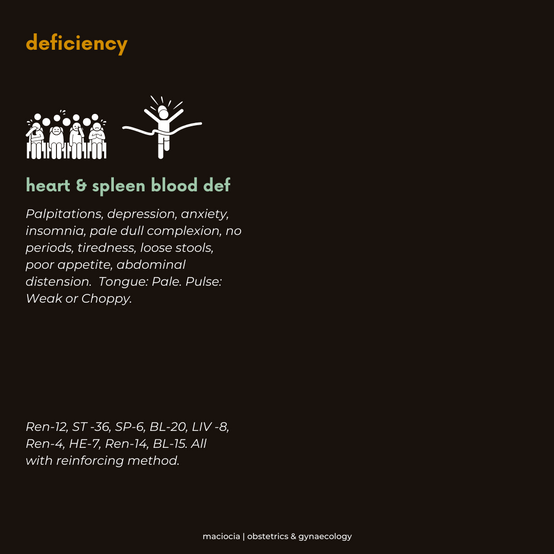Google? Where is my period?
- Andrea Dewhurst

- Jun 5, 2021
- 4 min read
Updated: Nov 30, 2023

Primary amenorrhea is when periods have not arrived by age 18. Secondary amenorrhea is when periods, which were previously present, stop (we need to rule out pregnancy) and don't return after three months (NICE)
This post will examine how acupuncture views amenorrhea and treats it. It also examines how biomedicine looks at this condition.
I hope you find this useful. And as always feel free to drop me a message with any questions.
Love from Andrea
Why?
Before we look at the patterns of amenorrhea in Chinese medicine, it is really important to consider why periods may not occur, or may stop.
Emotions
If you have read any of my blog posts or Instagram you will know the great importance which Chinese medicine places on emotions as a cause of disease. When we talk about emotions, we encourage the feeling of all emotions. Emotions are important and normal. The emotions we discuss below are considered to be in excess, or repressed as a cause of disease

Anger, which includes frustration, hatred and irritation can cause qi to stagnate. If qi stagnates then it will not move blood and the menses finally stops.
Worry and pensiveness can affect the lungs and spleen. This can eventually cause a deficiency of qi. Worry also knots the qi, which will also cause stagnation.
Shock can sever the link between the heart and the kidneys. Without this connection then the menses cannot function.
Guilt will also affect the heart and kidneys and the same result applies. A chronic state of fear will also affect the kidneys.
Excessive physical work or exercise
Excessive physical work or exercise can weaken the spleen. The spleen is central in both qi and blood production.
I also consider that excessive physical work or exercise which induces sweat (and again excessive) can also lead to a blood or yin deficiency. Sweat, a bodily fluid, is interchangeable with blood. In instances where loss of sweat is excessive then blood will be transformed into body fluids to keep homeostasis in the body. Think about when you have a sauna and can sometimes feel light-headed after? This would be an example of blood transforming in to body fluids for homeostasis.
Constitutional weakness

If there is a family history of amenorrhea this may suggest a deficiency of the Kidney jing.
Poor diet
A diet which lacks in nourishment (a post-heaven source of qi) will see a deficiency of qi and blood.
An excessive consumption of damp forming foods e.g. dairy and greasy foods will lead to formation of damp and phlegm which can obstruct the uterus.
Overwork
Long hours of working, without adequate rest can result in a deficiency of liver & kidney yin.
The patterns of amenorrhea
There are deficiency and excess causes of amenorrhea.
Deficiency
Liver & Kidney deficiency
Menses not started by 18, or stopped after becoming scanty, tiredness, lower backache, knee ache, dizziness, depression, mentally tired, lack of will-power, feeling cold. Tongue: Pale. Pulse: Deep, Weak.
Blood deficiency
Menstruation stops after several months of decreasing periods, dizziness, blurred vision, numbness and tingling, poor memory, insomnia, palpitations, slight anxiety, depression, dull-pale complexion, dry skin, dry hair, falling hair, dry eyes, tiredness. Tongue: Pale-Thin (unless there is also Spleen-Qi deficiency and Dampness, in which case it would be Swollen). Pulse: Choppy or Fine.
Spleen & Kidney Yang deficiency
No periods, tiredness, loose stools, feeling of cold, cold feet, poor appetite, lower backache, weak limbs, abdominal distension, dizziness, frequent-pale urination. Tongue: Pale, Swollen.
Pulse: Weak, Slow, Deep
Liver & Kidney Yin deficiency
Dizziness, dry eyes, tiredness, blurred vision, insomnia, lower backache, night-sweating, tinnitus. Tongue: Red without coating, cracks. Pulse: Floating-Empty or Fine-Rapid.
This pattern is more likely to occur in women over 30..
Lung Yin and Blood deficiency
No periods, a dry cough or with scanty, blood speckled expectoration, breathlessness, bright red lips, five-palm heat, malar flush, depression, sighing, sadness. Tongue: Red or normal-coloured without coating in the front. Pulse: Floating-Empty.
Heart & Kidney Yin deficiency
No periods, palpitations, insomnia, malar flush, depression, anxiety, dizziness, tinnitus, backache, night-sweating, a dry mouth and throat at night. Tongue: Red without coating, dry, cracked. Pulse: Floating-Empty, Rapid.
Heart & Spleen Blood deficiency
Palpitations, depression, anxiety, insomnia, pale dull complexion, no periods, tiredness, loose stools, poor appetite, abdominal distension.Tongue: Pale. Pulse: Weak or Choppy.
Excess

Stagnation of Qi & Blood
Secondary amenorrhoea, irritability, moodiness, abdominal distension and pain, depression, dark complexion. Tongue: Purple, or Purple sides. Pulse: Wiry.
Damp phlegm in uterus
Secondary amenorrhoea, prolonged cycle gradually developing to amenorrhoea, obesity, vaginal discharge, lassitude, feeling of heaviness, feeling of oppression in the chest, nausea. Tongue: Swollen, sticky-yellow coating which is thicker on the root. Pulse: Slippery.
What can I do?

Below are suggestions based on a variety of sources, both acupuncture and biomedical.
Acupuncture
The treatment of amenorrhea with acupuncture would mean a proper and correct diagnosis of your amenorrhea based on Chinese medicine principles. When the diagnosis is made then treatment would be expected to be from three months to twelve months.
Alongside acupuncture your practitioner would also suggests foods which are considered a part of your treatment. Below is a guidance of foods depending on your diagnosis.
Biomedicine

If you have amenorrhea then a really great book to read is The Fifth Vital Sign by Lisa Hendrickson-Jack. She discusses periods, as the fifth vital sign but she also discusses the causes of secondary amenorrhea but also offers guidance for measures you can take.
I have added snippets of her suggestions but highly recommend getting her book.
See your GP (see below)
See a therapist if you believe your amenorrhea is caused by emotions or disordered eating
See a dietician
Eat breakfast, lunch and dinner every day
Increase your fat intake. Lisa suggests specifically high fat dairy products but if you are a vegan then you will need to take separate advice about this.
Address perfectionism - the idea that we can do all and be all.
Exercise less and reduce intensity
Manage your stress
Find a support network
Next steps
Below is guidance taking from NICE (National Institute for Health & Care Excellence) about tests that your GP should undertake to rule out other causes for amenorrhea e.g. pregnancy, thyroid or polycystic ovarian syndrome.
























Comments